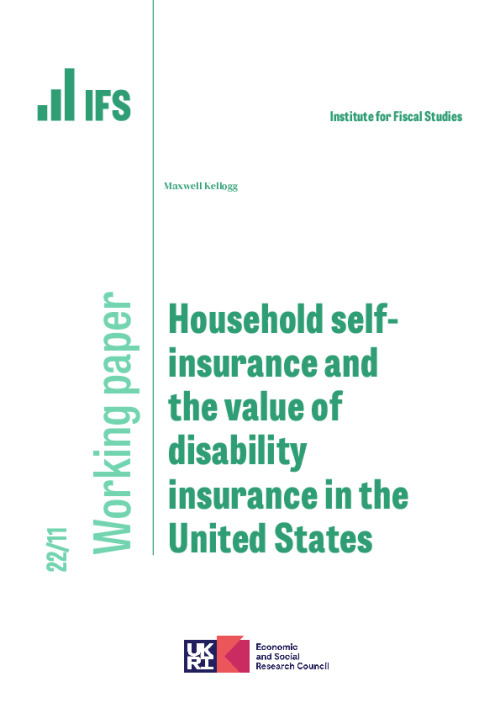Downloads
This paper uses a life cycle model to study the welfare implications of reforms to U.S. Disability Insurance (DI) while accounting for household self-insurance. In addition to crowding out the insurance value of DI, household self-insurance may drive negative selection into DI by reducing implicit application costs. Allowing for such interactions, I find that expansionary DI reforms do not necessarily improve welfare. However, an asset test reduces negative selection and improves the welfare effects of DI expansions. Household self-insurance crowds out the value of DI expansions, but abstracting away from insurance value can deliver erroneous policy recommendations.
Authors

Research Associate University of Oslo
Maxwell is a Research Associate at IFS and an Assistant Professor of Economics at the University of Oslo.
Working Paper details
- DOI
- 10.1920/wp.ifs.2022.1122
- Publisher
- Institute for Fiscal Studies
Suggested citation
Kellogg, M. (2022). Household self-insurance and the value of disability insurance in the United States. London: Institute for Fiscal Studies. Available at: https://ifs.org.uk/publications/household-self-insurance-and-value-disability-insurance-united-states (accessed: 7 May 2024).
More from IFS
Understand this issue

Cutting inheritance tax isn’t quite as simple as its proponents suggest
20 November 2023

Sure Start achieved its aims, then we threw it away
15 April 2024

A mess has been made of Child Benefit, and the clear-up operation may not be easy
29 March 2024
Policy analysis

Recent trends in and the outlook for health-related benefits
19 April 2024

4.2 million working-age people now claiming health-related benefits, could rise by 30% by the end of the decade
19 April 2024

Recent trends in public sector pay
26 March 2024
Academic research

Insurance, redistribution, and the inequality of lifetime income
2 November 2023

Police infrastructure, police performance, and crime: Evidence from austerity cuts
24 April 2024

The menopause "penalty"
18 March 2024
